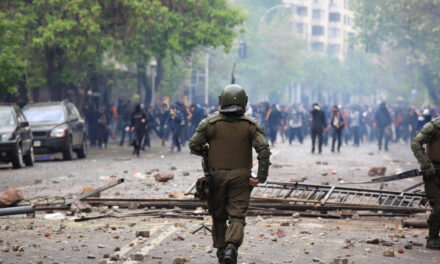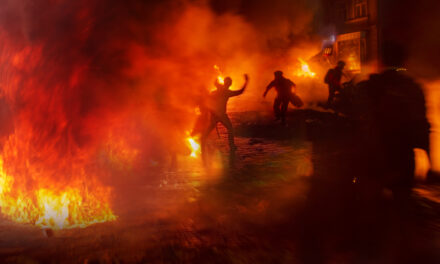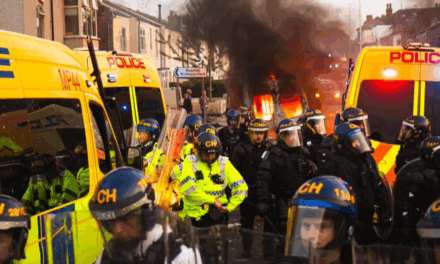The Calm Before the Storm
On September 10, 2025, conservative firebrand Charlie Kirk was tossing hats into a cheering crowd at a Utah campus. In the blink of an eye, a bullet tore through that sunny scene. Students screamed. People dove behind folding chairs. Security hustled him into an SUV. He would not survive the night. By dawn, the words “civil war” haunted every corner of social media.
You don’t need to be a conspiracy theorist to feel a chill when you think about that day. One public figure is gunned down, and the nation lurches closer to the brink. The tale you’re about to hear isn’t comfortable. It is meant as a wake‑up call for anyone who wonders how quickly order can crumble. We’ll track the facts and the reaction, but the tone is more urgent. Think of it as a warning whispered over a campfire, not an academic lecture.
The Spark That Could Ignite a Powder Keg
The shooter, Tyler James Robinson, drove to Utah Valley University before sunrise. He parked, changed clothes and climbed to a rooftop with a long‑range rifle. Hours later he fired once and vanished. He was caught the next day after authorities matched his DNA to a towel left near the weapon. He now faces charges that could put him away for life.
What investigators found made the act even more unsettling. The bullet casings were etched with strange phrases. One read “Hey Fascist! Catch!” and was adorned with arrows. Another quoted an old Italian partisan song. A third carried a bizarre furry joke. These aren’t slogans of a clear ideology; they are signs that online culture has seeped into real‑world bloodshed. The killer wanted people like us to talk about his messages.
The Man Who Divided a Nation
Charlie Kirk wasn’t just any pundit. He built Turning Point USA (TPUSA) into a powerhouse that mobilized young conservatives. He preached nationalism, Biblical values and free markets. He railed against trans rights and championed Donald Trump. Some saw him as a prophetic voice. Others saw a provocateur who inflamed tensions. Even far‑right groups who loathed his support of Israel turned him into a martyr once he was dead. That about‑face shows how quickly extremists can bend a story to fit their agenda.
Kirk leaves behind a widow and two kids. Whatever you think of his politics, the violence robbed a family of a father. For those already worried about social collapse, his death feels like one more crack in a foundation that is starting to fail.
A Drumbeat of Violence
If you’ve been paying attention, you know this was not an isolated event. In recent months there have been attempts on Donald Trump’s life, an arson attack on Pennsylvania Governor Josh Shapiro, and the murder of Minnesota lawmaker Melissa Hortman. Researchers counted more than 520 plots or attacks in just the first six months of 2025. Mass casualty attacks shot up nearly 200%. These aren’t just numbers. They are signs of a society under stress.
Older generations remember the assassinations of the 1960s. Back then, the violence centered on civil rights or the Vietnam War. Today the rage has no single focus. It’s a free‑floating hatred pumped up by social media feeds and endless conspiracy videos. Experts warn that the combination of angry rhetoric and easy access to guns is like gasoline waiting for a spark. When your phone keeps telling you that your neighbors are monsters, how long until someone acts?
Voices Demanding Vengeance
Within hours of the shooting, the airwaves were filled with war cries. Conspiracy king Alex Jones pounded the table and shouted “This is war!” again and again. Influencer Mike Cernovich demanded congressional hearings and legal crackdowns on wealthy liberals. Firebrand Blake Masters called for RICO charges against nonprofits. Each post drew more followers into the belief that an armed conflict had already begun.
Lawmakers piled on. Congressman Derrick Van Orden declared that the gloves were off. Anna Paulina Luna shrieked on the House floor that Democrats were to blame. Marjorie Taylor Greene urged her fans to rise up. Billionaire Elon Musk claimed the left was “the party of murder.” In a matter of hours, a political assassination morphed into a rallying cry for civil war.
Not everyone joined the hysteria. Former Vice President Mike Pence asked for prayer. Erika Kirk begged people to honor her husband through peaceful activism. But on the internet, outrage travels faster than pleas for restraint. If you’ve ever wondered how quickly a nation can turn on itself, watch those clips and shiver.
Extremists Circle Like Vultures
For white nationalists and militias, the murder was a gift. They had long despised Kirk. Now they spun his death as proof of a campaign to exterminate conservatives. Ryan Sánchez, head of a notorious network, posted that “nothing can stop what is coming” as he pocketed donations meant to “purge the country” of unwanted ideas. He organized a vigil that degenerated into chants of “White man fight back” and “Death to the Left.”
Chapters of the Proud Boys plastered Nazi imagery online and called for violence sanctioned by the state. Freed from prison by a presidential pardon, Enrique Tarrio promised a new wave of doxxing and harassment. Even more chilling, militia leader Stewart Rhodes vowed to rebuild the Oath Keepers and begged Donald Trump to unleash militias under the Insurrection Act. Meanwhile, Jessica Watkins, a veteran of January 6, said Kirk’s assassination pulled her back into the fray. These figures may lack the numbers to launch a full‑blown uprising, but as any prepper knows, small bands can inflict enormous damage when chaos reigns.
Researchers warn that once extremists believe the rules no longer apply, they act with deadly efficiency. History is full of examples where a few determined men and women ignite wider unrest. The noise we hear now could be the opening chapter of something far worse.
Meme Madness Meets Real‑World Bloodshed
One eerie detail has been overlooked. The assassin’s bullets were carved with video‑game references and internet memes. Arrows from Helldivers 2, lyrics from an old resistance song, even a crude furry joke. These aren’t just jokes. They are signals from someone who lives online. He wanted gamers, trolls and extremists to spread his message. The line between entertainment and violence is thinner than many think.
After the murder, gaming forums shut down threads. Moderators begged users not to speculate. But the damage was done. Every time a tragedy becomes a meme, it normalizes the idea that violence is content. For communities already flirting with the edge, this blurring of worlds is dangerous.
Speech Chilled and Tempers Flaring
Kirk’s death also set off a wave of punishments. People were fired for making crude jokes. Florida’s education boss threatened to yank licenses from teachers who said the wrong thing. Conservative influencers stood outside the Illinois governor’s mansion urging viewers to “take action,” forcing police to tighten security. It felt like every comment could cost you your job or your safety.
Yet there were moments of humanity. At a memorial service, Pastor Angel Barnett urged mourners to let faith guide their response. Ordinary citizens brought flowers and candles instead of fists. Those small acts remind us that compassion still flickers in the darkness.
Echoes of Past Bloodletting
Is this the prelude to another civil war? Scholars remind us that political killings often come in waves. In the 1960s, assassinations of John F. Kennedy, Martin Luther King Jr. and Robert Kennedy shook the country. Each killing emboldened others. Today, the polarization is even more diffuse. People aren’t just fighting over one issue; they view anyone who disagrees as an enemy. That makes compromise almost impossible.
Writers like Adrienne LaFrance warn that the term “civil war” may not mean armies lining up on fields. It could look like a “soft secession,” with states and communities drifting so far apart that they no longer function as a single nation. Former prosecutor Mary McCord asks a haunting question: would you sacrifice your grandchildren in a war against your neighbor? Most people say no. But ask yourself whether your community is prepared if others say yes.
How People Snap
Most lone wolves aren’t ideologues. They are lonely, angry and steeped in online fantasies. Research shows that personal grievances, mental health struggles and algorithm‑driven echo chambers mix together in unpredictable ways. Our shooter etched memes on bullets because he knew it would get attention. He wanted to be part of a story that spans gamer culture, politics and extremism. When enough people seek fame through violence, the world grows more dangerous.
The feedback loop is vicious. Social media rewards outrage. Each like and share validates radical thoughts. Violence becomes both a performance and a recruiting tool. If you’re a prepper, you already know that the first rule of survival is awareness. Pay attention to these patterns and plan accordingly.
Paths of Preparation and Restraint
For those who value peace, there are still options. Editorials have urged readers to reject calls for revenge and to practice civic tolerance. Scholars say correcting misperceptions about your political rivals lowers the chance of supporting violence. Others argue that leaders must cooperate publicly, even in small ways, to signal that democracy isn’t dead. In a fractured world, even modest gestures matter.
Grassroots groups like Majority in the Middle encourage conversations across the aisle. They remind us that not every opponent is a zealot. Many Americans responded to Kirk’s death by holding vigils, making donations and comforting his family. Acts of solidarity are a form of preparation too; they build networks of trust that help communities weather a storm.
Staring Down the Abyss
When I imagine the months ahead, I feel a knot in my stomach. Extremists are crying for war. Violence is rising. The web feeds our worst impulses. If nothing changes, we may see more shootings, more riots and more rights curtailed. That’s why preppers stock food, learn first aid and build community. We don’t want violence, but we refuse to be blindsided.
Yet there is still a choice. Most people crave peace. You and I shop at the same stores, drive the same roads and rely on the same firefighters when things go wrong. Every time you choose conversation over condemnation, you push back against the slide. Every time a leader refuses to inflame tensions, they buy us time.
No one can say for sure whether America will descend into civil conflict. The assassination of Charlie Kirk is a warning shot. Take it seriously. Stay alert. Prepare for turbulence. And hold on to the hope that cooler heads will prevail. In the coming storm, your choices — and your preparations — may make all the difference.





